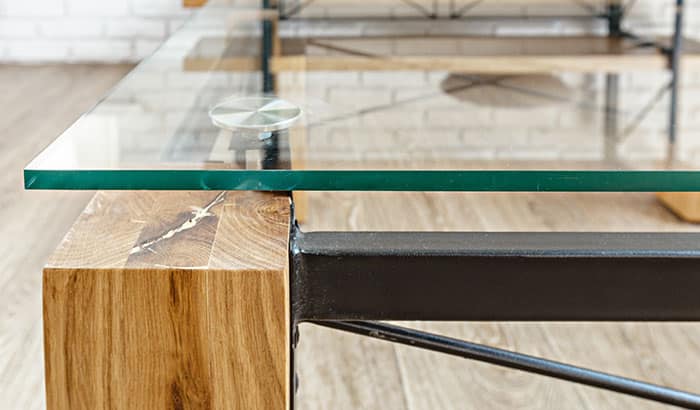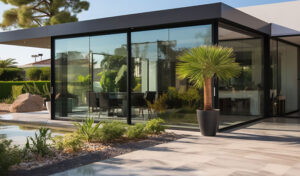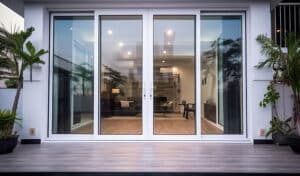A glass tabletop is a popular choice for homeowners because it offers a sleek and modern look that can complement many different décor styles.
A glass tabletop dining table, coffee table, or desk can be a beautiful and functional addition to any home or office. One potential drawback is that they can be prone to scratching. This can be frustrating and unsightly, especially if the scratches are deep or noticeable.
Today, we’ll explore the issue of whether glass table tops scratch easily and what you can do to prevent or minimize scratches on yours.
Glass Type
First, you must understand that all types of glass are prone to scratching to some extent. This is because glass is a hard and brittle material that can be easily damaged by abrasive or sharp objects. However, the degree to which a glass surface will scratch depends on the type of glass and the finish quality.
There are several different types of glass that are commonly used for table tops, including tempered glass, laminated glass, and standard float glass. Tempered glass is the most durable and scratch-resistant option, as it is treated with a special heat and chemical process that makes it four to five times stronger than standard float glass.
Laminated glass is also a sound choice for a tabletop because it is made by sandwiching a layer of plastic between two layers of glass, which makes it more resistant to scratching and breaking.
Standard float glass is the least durable of these options and is more prone to scratching and breaking than tempered or laminated glass. We don’t advise using this type of glass for your glass tabletop dining table or desk.
Glass Finish
In addition to the type of glass, the finish can also affect its scratch resistance. A polished finish is the most scratch-resistant option, as it has a smooth and shiny surface that is less prone to damage. A matte finish is less scratch-resistant because it has a rougher surface that is more prone to abrasion.
Hardened or tempered glass has a more durable finish, making it more resistant to scratching than untreated or annealed glass. However, even hardened glass can still be scratched if it is subjected to abrasive or sharp objects.
How to Prevent Scratching Your Glass Tabletop
If you own a glass tabletop desk or dining, you know how much force it takes daily. To prevent or minimize scratching on your table, there are a few steps you can take:
- Use coasters and placemats – One of the easiest ways to prevent scratching on a glass tabletop is to use coasters and placemats. Coasters protect the surface of your table from liquid spills, which can cause damage over time. Placemats also provide a barrier between your table and any sharp or heavy objects that you may place on it. Both coasters and placemats are inexpensive and easy to use, and they can go a long way in preserving the appearance of your beloved furniture piece.
- Use felt pads under furniture legs – Another effective way to prevent scratching on a glass table is to use felt pads under the legs of any furniture that may encounter the table. These pads are made of soft, protective material that will help to cushion the impact of furniture on the glass surface. They are easy to install and can be found at any home improvement or hardware store.
- Clean and polish regularly – Whether you own a glass tabletop desk or dining table, maintenance is key. Regular cleaning and polishing of your table can help to prevent scratching and maintain its shine. Use a soft microfiber cloth to dust the surface and remove any dirt or debris that may cause scratching. Then, use a glass cleaner and a lint-free cloth to clean the table, making sure to get into any corners or crevices. Finally, use a glass polish or wax to give the table a shine and provide a protective layer.
- Avoid using abrasive materials – Certain materials can easily scratch a glass table, such as sand, gravel, or rough-edged objects. To prevent scratching, avoid using these materials on or near your table. If you must use them, do so with caution and place a protective layer between the glass and the abrasive material, such as a placemat.
- Use a tablecloth or runner – Using a tablecloth or runner on your glass tabletop dining table can provide an extra layer of protection against scratching. Tablecloths and runners are made of soft, protective materials that can help to prevent sharp or heavy objects from contacting the glass surface. They can also help to hide any scratches that may already be present on the table.
How to Remove Scratches From a Glass Tabletop
If you notice a scratch on your glass table top desk or dining table, there are a few methods you can apply to try to remove it. Luckily, scratches are rarely permanent, and with some work and the right products, you can restore your tabletop to its original state.
One option is to use a glass scratch remover, a product specifically designed to remove scratches from glass surfaces. You can also use a soft cloth and a mild detergent, or glass cleaner to buff the scratch gently. If these methods do not work, you may need to have the glass professionally polished or replaced.
Murray Glass Is the Expert in Glass Table Tops
Glass tabletops can scratch easily, but the degree of scratch resistance depends on the type of glass and the quality of its finish. For the highest quality tabletops on the market, you need Murray Glass. We offer beautiful custom glasswork to suit whatever your needs may be.
We serve cities in Northern Utah, including Salt Lake City, Midvale, South Jordan, Lehi, Orem, and more. Contact us with any questions or to schedule your free consultation today!





